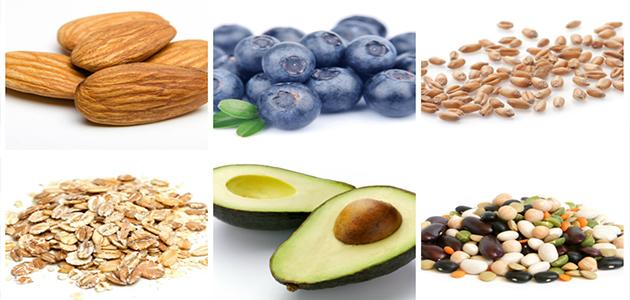Contents
Duck eggs
Duck egg is most commonly produced in China and Southeast Asia, and it is considered a protein-rich and low-cost source at the same time, [1] and compared to the size of chicken eggs, it is about 50% larger, and the yolk of duck eggs is Large in size and golden in color, in addition to having a creamy texture and creamy flavor that many people prefer, and although the color of chicken eggs is limited to white or brown, the colors of duck eggs are different, and they range from pale blue, greenish-blue, or gray-brown Charcoal, or the white color, and one of the most important differences with chicken eggs is that it provides a higher percentage of some nutrients important to the health of the body, including: Protein . [2] [3]
The nutritional value of duck eggs
The following table shows the nutritional value per 100 grams of cooked duck eggs: [4]
| The food component | Nutritional value |
|---|---|
| water | 66.26 milliliters |
| Calories | 209 Calories |
| Protein | 14.45 grams |
| Fats | 15.53 grams |
| Carbohydrates | 1.64 g |
| Dietary fiber | 0 gr |
| Sugars | 1.05 g |
| Calcium | 72 milligrams |
| Iron | 4.34 milligrams |
| magnesium | 19 milligrams |
| Phosphorous | 248 milligrams |
| Potassium | 250 milligrams |
| Sodium | 493 milligrams |
| Zinc | 1.59 milligrams |
| Copper | 0.07 milligrams |
| Selenium | 41.1 mcg |
| Vitamin B1 | 0.15 milligram |
| Vitamin B2 | 0.433 milligram |
| Vitamin B3 | 0.214 milligrams |
| Vitamin B6 | 0.268 milligrams |
| Folate | 68 micrograms |
| Choline | 237.7 milligrams |
| Vitamin B12 | 5.18 micrograms |
| Vitamin E. | 1.51 milligrams |
| Vitamin D | 1.9 mcg |
| Vitamin K. | 0.5 mcg |
| Vitamin A | 219 micrograms |
| Saturated fat | 4.152 grams |
| Monounsaturated fats | 7.36 grams |
| Polyunsaturated fats | 1.379 g |
| Cholesterol | 997 milligrams |
Benefits of duck eggs
The following points explain the benefits of duck eggs according to their nutrient content: [2]
- Rich source of protein: duck eggs contain the highest quality protein. That is, it provides all the essential amino acids that the body needs to make proteins.
- Rich source of antioxidants: such as carotenoids; Carotene, cryptoxanthin, zeaxanthin, and lutein, which provide the yolk of duck eggs with a yellow-orange color, and these antagonists are compounds that may reduce the risk of damage to cells and DNA as a result of oxidation processes, which may lead to some chronic diseases and associated diseases By age.
- Rich source of choline: The yolk of duck eggs is one of the sources rich in choline, a food substance that promotes many different body functions, such as Cell growth, metabolism, and it should be noted that the body produces a small amount of this nutrient, while most of it comes from consuming foods rich in it. [2] [5]
- A rich source of vitamins: The following table shows how much eggs provide from the most important vitamins that the body needs on a daily basis: [6]
The vitamin Daily Value Vitamin A 9% Vitamin B1 7% Vitamin B2 17% Vitamin B5 13% Vitamin B9 14% Vitamin B12 63% Vitamin E. 5%
- A source rich in minerals: compared to chicken eggs, and as mentioned earlier at the beginning of the article, duck eggs provide the body with a higher percentage of nutrients, including minerals, as it provides 52% of the daily needs of selenium, compared to 45% provided by chicken eggs, while That the daily amount of iron provided by duck eggs is 21%, which is nearly twice what is available in chicken eggs. As it provides 10% of the daily amount of this mineral, [2] in addition to some other minerals, as it provides the body with 15% of the daily amount of phosphorus, and 7% of the daily amount of zinc. [6]
Damage to duck eggs
The degree of safety of duck eggs
The risk of exposure to salmonella bacteria is higher in some groups, including; Infants, children, pregnant women, the elderly, and others who have a weak immune system, they should avoid eating raw or undercooked eggs. [2]
Precautions for using duck eggs
The following points explain some of the caveats associated with consuming eggs:
- The risk of high cholesterol levels: Diabetics, and those with a family history of heart disease, are advised to be careful and careful when consuming egg eggs, because they contain a high level of cholesterol . [2]
- The risk of developing egg allergy: The consumption of eggs is one of the most common causes of allergy in children, and it should be noted that some of them can overcome this sensitivity before reaching the stage of adolescence, and the symptoms of egg allergy range from simple to severe or what is known as anaphylaxis , and the most common symptom is skin allergy, while other symptoms include; Runny nose, itching, tears, cramps, nausea or vomiting, and one of the best ways to control and relieve egg allergy is to avoid eating all foods that contain eggs or egg products. [7]
What are the benefits of duck eggs for children
There is no information available about the benefits of duck eggs for children specifically, but it is worth noting that eggs may be an important part of a healthy diet for children, as it provides them with nutrients necessary for their health, and according to the Dietary Guidelines for Americans, eggs belong to a group of Protein foods along with other seafood, poultry, soy foods , nuts and seeds, and red meat , and it has been shown that children between the ages of nine to thirteen years need to consume an amount ranging from 5 to 6 servings of this food group daily, While the younger children may need between 2 to 4 portions of the same group, it should be noted that one portion is equivalent to about 28.3 grams. [8]
References
- ↑ "Duck Eggs" , www.sciencedirect.com , (2017), Retrieved 23-6-2020. Edited.
- ^ A b t w c h the Anne Danahy (18-6-2020), "Duck of Eggs: Nutrition, Benefits, And Side Effects" , Www.healthline.com , Retrieved 23-6-2020. Edited.
- ↑ FM Makinde, KD Awoyera, AO Oguntunji (9-1-2019), “Effect of Substitution of Chicken Egg with Duck Egg on Biscuit Quality” , Sustainable Food Production , Folder 5, Page 38-47. Edited.
- ↑ "Duck egg, cooked" , www.fdc.nal.usda.gov , 4-1-2020, Retrieved 23-6-2020. Edited.
- ↑ Jamie Eske (25-11-2019), “Everything you need to know about choline” , www.medicalnewstoday.com , Retrieved 6/23-2020. Edited.
- ^ A b Siddhi Profile Lama (20-3-2019), "Why Duck of Eggs More Nutritious Post Are Even Than the Chicken of Eggs" , Www.livestrong.com , Retrieved 23-6-2020. Edited.
- ↑ "Egg allergy" , www.betterhealth.vic.gov.au , 7-2017, Retrieved 23-6-2020. Edited.
- ↑ Vincent Iannelli (2-3-2020), "How Many Eggs Can Your Child Eat Every Day?" , Www.verywellfamily.com , Retrieved 23-6-2020. Edited.
















